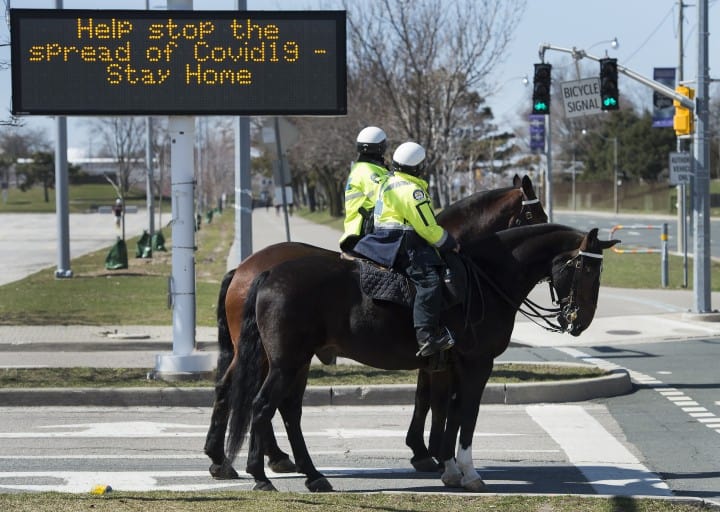Crimes and policing change amid COVID-19 pandemic, Ontario forces say
Published April 3, 2020 at 12:08 pm

COVID-19 has changed both criminal behaviour and policing in Ontario.
Some of the crime trends, such as a surge in domestic violence, have been predictable. Others, such as a significant rise in car thefts, have perplexed officers.
Both trends have been seen by York Regional Police. The force, which has jurisdiction north of Toronto, crunched some numbers comparing this March to last year’s.
Impaired driving is down 29 per cent in the region. York police had long tried various measures to curb the problem, especially after Marco Muzzo drove drunk in September 2015 and killed four members of the Neville-Lake family, including three young children.
Emotional campaigns pleading with drivers to avoid drinking and driving and then naming and shaming drunk drivers didn’t put a dent in the numbers.
But COVID-19 did.
“Thankfully impaired driving charges are down — likely just because people aren’t out at bars and clubs socializing with friends as much as they had previously been,” said Sgt. Andy Pattenden.
Domestic violence was up 22 per cent in the region last month, compared to April 2019.
“We believe it’s purely from the number of people home and in tight quarters and a real change in everyday routines and some people clearly aren’t managing it well,” Pattenden said.
Pattenden could not explain why car thefts were up a whopping 44 per cent. But a 45 per cent jump in commercial break-and-enters was perfectly predictable.
“We figured we’d see that,” Pattenden said. “Businesses are closed and we have a lot of industrial parks in York Region — those areas are relatively unoccupied.”
The force has stepped up patrols in response, including re-deploying its helicopter to cover those areas more than usual, he said.
In Toronto, crime is down across the board, except for homicides, which remain stable, and domestic violence, which has seen a slight uptick.
“Assaults, robberies, shootings are all down,” spokeswoman Meaghan Gray said.
Provincial police say it’s too early to see any big trends, but major crimes haven’t really changed.
“Criminals will be criminals,” said Staff Sgt. Carolle Dionne.
What most forces surveyed have seen is a jump in stunt driving, those driving more than 50 km/h over the speed limit.
York saw a nearly four-fold increase in March, with 40 charges compared to 11 in March 2019.
“The increase is most certainly due to the relatively empty roads,” Pattenden said, adding that they caught one driver going 148 km/h in a 50 km/h zone.
The OPP is seeing the same overall number of stunt drivers — they nabbed 92 last week including one driver who clocked 209 km/h on Highway 401 near Napanee, Ont., where the limit is 100 km/h.
“I just shake my head at these speeds,” Dionne said.
While fraud is down in Toronto and York, both forces say they’ve noticed a surge in COVID-19-related frauds.
Toronto police said the pandemic “has created the perfect opportunity for scammers seeking to defraud worried, isolated and emotionally vulnerable targets.”
Meanwhile, departments are also figuring out how to use new powers under the Emergency Management and Civil Protection Act.
Dionne said OPP have yet to issue any tickets or lay charges under the new law, deciding to educate and warn first. The same goes for York, according to Pattenden.
Toronto Mayor John Tory said Thursday the city has created a new bylaw where people must remain at least two metres apart in parks and public squares. Police and bylaw officers will be blitzing the city’s parks to enforce the new bylaw, Tory said.
Toronto police are issuing plenty of warnings, Gray said, but have also begun using their new powers for those who don’t listen.
The force has issued 14 tickets so far for non-compliance.
“We’re encouraging people to continue their good behaviour, but we’ll enforce if we have to,” said Gray.
Hamilton police have used their new powers in an unexpected way.
Officers tracked and arrested an alleged cocaine dealer last Friday. In addition to drug trafficking charges, they also slapped on a $750 ticket for operating a non-essential business.
“Drug dealing, we say, is not an essential service,” said Const. Jerome Stewart.
INsauga's Editorial Standards and Policies